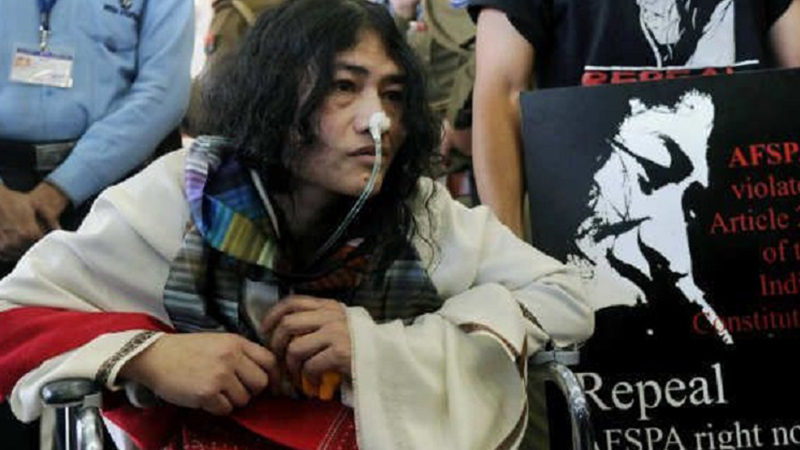Story of Iron Lady – Irom Sharmila

It was November 2nd, the year 2000 when Assam Rifles shot and killed ten people, near Imphal. One of the deceased was a national bravery award winner. Three days later, a 28-year-old lady started an indefinite hunger strike against the arbitrary regime of the armed forces in Manipur, owing to the passing of AFSPA. After another three days, she was arrested for attempted suicide. After that, a hospital ward became her prison and continued to be so for the next sixteen years. The one to have bravely struggled against the capricious rule of the army, and to have dedicated all her adult life to a cause she believed in, was Irom Sharmila.
Her pacifist fighting back, Gandhian measures of protest, her unbroken resolve, and her bravery have made her a symbol of protest against the army rule that continues to harass people, not only in Manipur but also in Jammu and Kashmir and Assam.
On 8th of July this year, the Supreme Court of India decidedly declared that the armed force cannot use excessive force, even in areas covered under AFSPA.
On 26th of the same month, Irom Sharmila declared a change of strategy. She announced that she would break her fast and join politics to strive for the betterment of the State. On August 9, 2016, she broke her sixteen-year-old strike by tasting honey. She grimaced as she did it, probably because her taste buds are not at home with any kind of food intake.
But the reaction of her very own people was different than anyone could have anticipated.
She was criticized for her decision to break her fast, and it was alleged that after joining politics, she would become ‘one of their kind’. She was shunned and could not even find a place to stay, and had to return to her hospital ward. She was even denied entry in ISKON temple. The reason provided was that she would ‘attract controversy’.
It is a peculiar conclusion to reach, as her hunger strike cannot be called a complete failure. In 2004, Manipur government withdrew AFSPA from seven assembly seats, and it would be unfair to state that Irom Sharmila made no contribution to it. In the very same year, then Prime Minister Manmohan Singh handed over the Kangla Fort, that Assam Rifles had occupied since 1949, to the state government.
Her resolve did not break when she was rearrested for attempted suicide after she took her protest to New Delhi and demonstrated in front of Jantar Mantar, or even after her personal life was shaken berserk when she fell in love with Desmond Coutinho, through exchange of letters, which had commenced after Coutinho had written to her past reading her works on the situation of Manipur.
Now, time will tell us how the new strategy of Sharmila works out. Meanwhile, it is upon us to contemplate how long will our government resolve to passing of distressing acts like AFSPA, and whether we are imposing unreasonable ideals on our women social activists.





